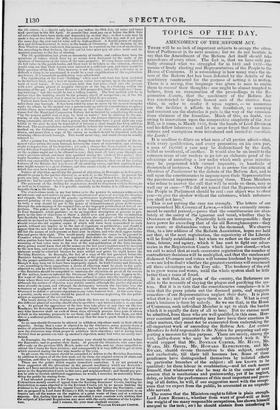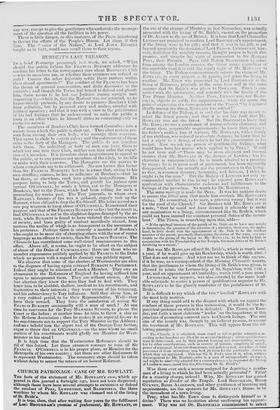TOPICS OF THE DAY.
AMENDMENT OF THE ;REFORM ACT.
THERE will be no lack of important subjects to occupy the atten- tion of Parliament in its next session ; but we do not hesitate to say that the Amendment of the Reform Act itself should take precedence of every other. The fact is, that we have only par- tially obtained what we struggled for in 1831 and 1832—the means of freely electing real Representatives of the People to the House of Commons. It is astonishing in how many ways the in- tent of the Reform Act has been defeated by the defects of the machinery constructed for the purpose of setting it in motion. There is a saying, that language was given to men to enable them to conceal their thoughts : one might be almost tempted to believe, from an examination of the proceedings in the Re- gistration _Courts, that the, machinery of the Reform Act was constructed to deprive honest men of the elective fran- chise, in order to confer it upon rogues, — so numerous are the facilities it affords to the fraudulent, so annoying and constant are the obstacles it puts in the way of the conscien- tious claimant of the franchise. Much of this, no doubt, was owing to innovations upon the comparative simplicity of the first Bill, as it came, in March 1831, from the hands of Lord DURHAM and his fellow labourers: and let us never forget that those inno- vations and corruptions were introduced and carried to conciliate the Lords It is needless to dilate on what men of all parties admit—that, with every qualification, and every precaution on his own part, a man of 10,000/. a year may be disfranchised by the fault, wilful or accidental, of another. It would also be an insult to the common sense of our readers to go into an elaborate proof of the advantage of amending a law under which such gross injustice may be perpetrated with virtual impunity, in hundreds of thousands of instances. Our object is to arouse the attention of Members of Parliament to the defects of the Reform Act, and to call upon the constituencies to impress upon their Representatives the paramount importance of removing them. Those Members who refuse to answer the call that will be made on them, may as well say at once—" We did not intend that the Representation of the People in Parliament should be real : our object was to cheat you—to give the shadow without the substance, which substance you shall not have." This is not putting the case too strongly. The letters of our correspondent Mr. COOPER of Lewes,—which we earnestly recom- mend to careful perusal,—prove that the constituencies are abso- lutely- at the mercy of the ignorant and venal, whether they be Overseers or Barristers. Practically both are irresponsible : they have power far exceeding that of the old Boroughmongers—they can create or disfranchise voters by the thousand. We observe that, in a late address of the Reform Association, hopes are held out that, at the next registration, the superiority of the Liberals will be firmly established : but when we reflect on the sacrifice of time, labour, and money, which it has cost to fight our adver- saries in the Registration Courts which have just closed,—when we call to mind that at each successive registration the number of contradictory decisions will be multiplied, and that the careless and dishonest Overseers and voters will become hardened by impunity, —we are led to doubt whether the greatest exertions will counteract all these advantages on the Tory side. The tendency of the evil is to grow worse and worse, until the whole system shall be little better than a mass of fraud.
It is well that, in all parts of the country, the Reformers are alive to the necessity of staying the plague and purifying the sys- tem. But it is in vain that the constituencies complain—it is in vain that the press points out the diseased parts, and suggests remedies—if our Representatives neglect their duty. It is plain what that is; and we call upon them to fulfil it. What is every man's business is done by nobody. So we see that, in the House of Commons, each individual Member is apt to shirk the burden which it is equally the duty of all to bear. But no excuse must be admitted, from those who are well qualified, in this case. Hof- ever constant and praiseworthy may have been their exertions in other matters, they must riot be exonerated from undertaking the all-important work of amending the Reform Act. Let certain Members be held responsible to the Nation for preparing and sup- porting a measure for this purpose. There are surely, among the 658, half-a-dozen who may be safely intrusted with it. We would suggest that Mr. BONHAM CARTER, Mr. Hume, Mr. WARD, Mr. GROTE, Mr. HOWARD ELPHINSTONE, and Mr. EW ART, sheuld devote themselves to this subject, entirely and exclusively, till their bill becomes law. Some of these gentlemen have distinguished themselves by isolated efforts on particular branches of the subject: all are known to be qualified: let them labour in combination,—and let each assure himself, that whatsoever else he may do in the course of next session that is meritorious and praiseworthy, yet if he neglects delay, or hinder the performance of this most important and press- ing of all duties, he will, if our suggestion meet with the accept- ance that we expect from the public, be accounted as an unprofit- able servant. The course that the Ministers ought to follow is plain enough. Lord JOHN RUSSELL, whether from want of good-will or. from the weight of too many responsible occupations, has shown himself
f
unequal to the task; an-I he should abstain from interfering
any way, except to give the gentlemen who undertake the manage- ment of the question all the facilities in his power.
There is little danger, in this instance, of the Peers interfering to thwart the efforts of the People's House. Let them if they dare. The " voice of the Nation," as Lord JOHN RUSSELL taught us in 1831, would soon recall them to their senses.



























 Previous page
Previous page